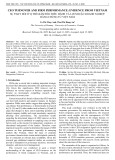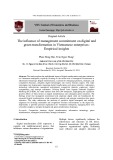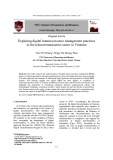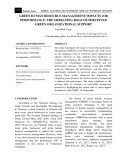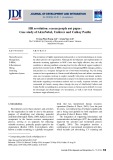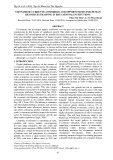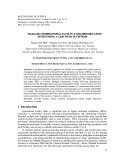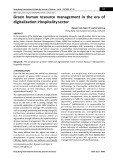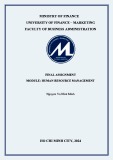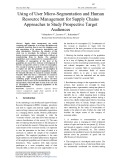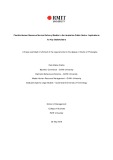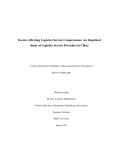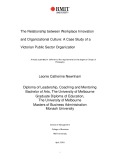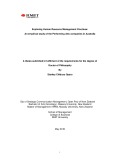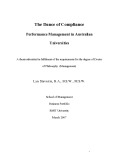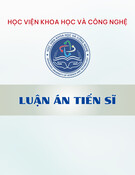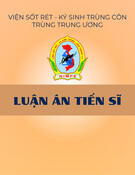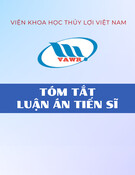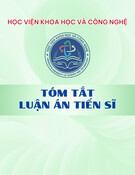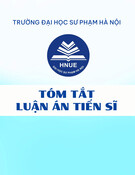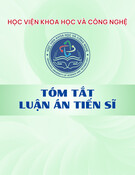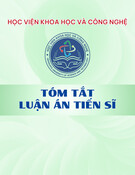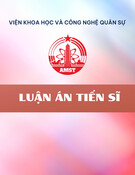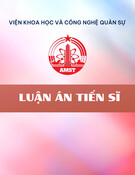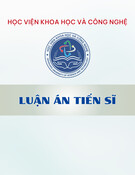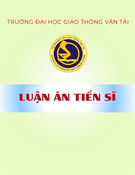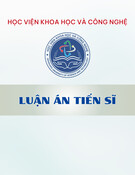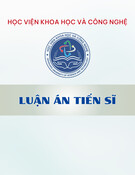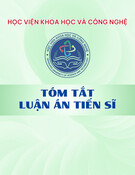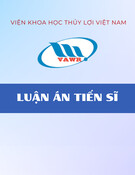
1
RESEARCH INTRODUCTION
1. Rationale of the research
Organizational culture is the living environment of the employees and
companies. It helps form thinking, creates emotions, and tries to connect people
according to common goals. Organizational culture is a cord that extends and
increases the value of individuals; it is a valuable asset that every organization needs
to promote. Organizational culture creates competitive advantages and is the
intangible value that helps customers distinguish enterprises. Organizational culture
can be used to measure the performance of an organization.
In the context of sustainable development and fierce competition among firms,
building human resources that engages with the organization is always the ultimate
goal of enterprises, helping the organization improve its competitive advantage.
According to research on Human Resources Management, the objectives of
enterprises are hard to achieve if employees are superficially engaged and have low
productivity; especially excellent employees (talents) need to be given first priority,
as they are considered valuable assets of the organization. Employee engagement is
the main factor contributing to an organization’s productivity, efficiency, and long-
term existence. Highly engaged employees tend to achieve greater sales and profits.
In many ways, to improve employee engagement with the organization,
organizational culture is considered an important and effective tool. Strong organizational
culture will be the foundation to enhance the reputation and position of enterprises. It
helps enterprises reduce conflicts and is an invisible adhesive that helps employees engage
with the organization. A lot of dimensions of organizational culture are considered;
however, the relevance of this research in Vietnam is an issue as Vietnamese culture has
its own characteristics and is different from the world. Vietnamese enterprises may be left
behind if they do not immediately adapt to changes from the outside and develop
organizational culture. Vietnamese enterprises are also currently facing fierce competition
in human resources, especially high quality and scarce human resources.
Moreover, from the perspective of human resource managers, theoretical and
empirical gaps are initiated to conduct the “A study on the impacts of organizational culture
on employee engagement with the organization in Vietnamese enterprises”. The research
suggests policies for managers to better understand the impact of organizational culture on
employee engagement with the organization. The study also provides theoretical and
empirical evidence on enhancing engagement of employees with the organization.
2. Research objectives and questions
2.1 Research objectives
The main objectives of the thesis is building models and etimating the impacts
of organizational culture on employee engagement with the organization in
2
Vietnamese enterprises. From empirical results, the thesis proposed recommendations
to improve employee engagement with the organization through dimensions of
organizational culture from the perspective of human management practices.
2.2. Research questions
To achieve the thesis’s objectives, the thesis will answer the following research
questions:
- What are the criteria for assessing organizational culture and employee
engagement with the organization?
- How does organizational culture affect employee engagement with the
organization? How organizational culture aspects affect each different element
of the employee engagement?
- Which are suggestions that help enhance the aspects of organizational culture
and improve employee engagement with the organization within the
Vietnamese enterprises?
3. Scope and subjects of the research
3.1. Research subjects
Research subjects: The thesis focused on researching the impact of
organizational culture on employee engagement with the organization in Vietnamese
enterprises. Specifically, the research subjects include: (i) expressive dimensions in
organizational culture and measures of organizational culture in enterprises, (ii)
employee engagement and measures of employee engagement and (iii) the impact of
organizational culture on employee engagement with the organization in enterprises.
3.2. Research scope
Secondary data were collected in the period 2012 - 2019. They include
statistics related to the variables representing measurement of organizational culture
and employee engagement with the organization. Primary data were collected in 2019
through the survey questionnaire that was developed by the thesis. There were 791
respondents who answered the questionnaires, but 711 observations were used for
analyzing.
- Surveyed enterprises are in all 3 types of ownership (State-owned, private,
and FDI enterprises), and they are diverse in size and business/industries.
- The thesis conducted surveys with Vietnamese enterprises, including
enterprises located in Northern, Central and Southern.
4. Research methods
The thesis used both qualitative and quantitative research methods.
- Qualitative research methods were used to explore factors/items and
variables that were used for questionnaire development. Interviewees consists of 20








